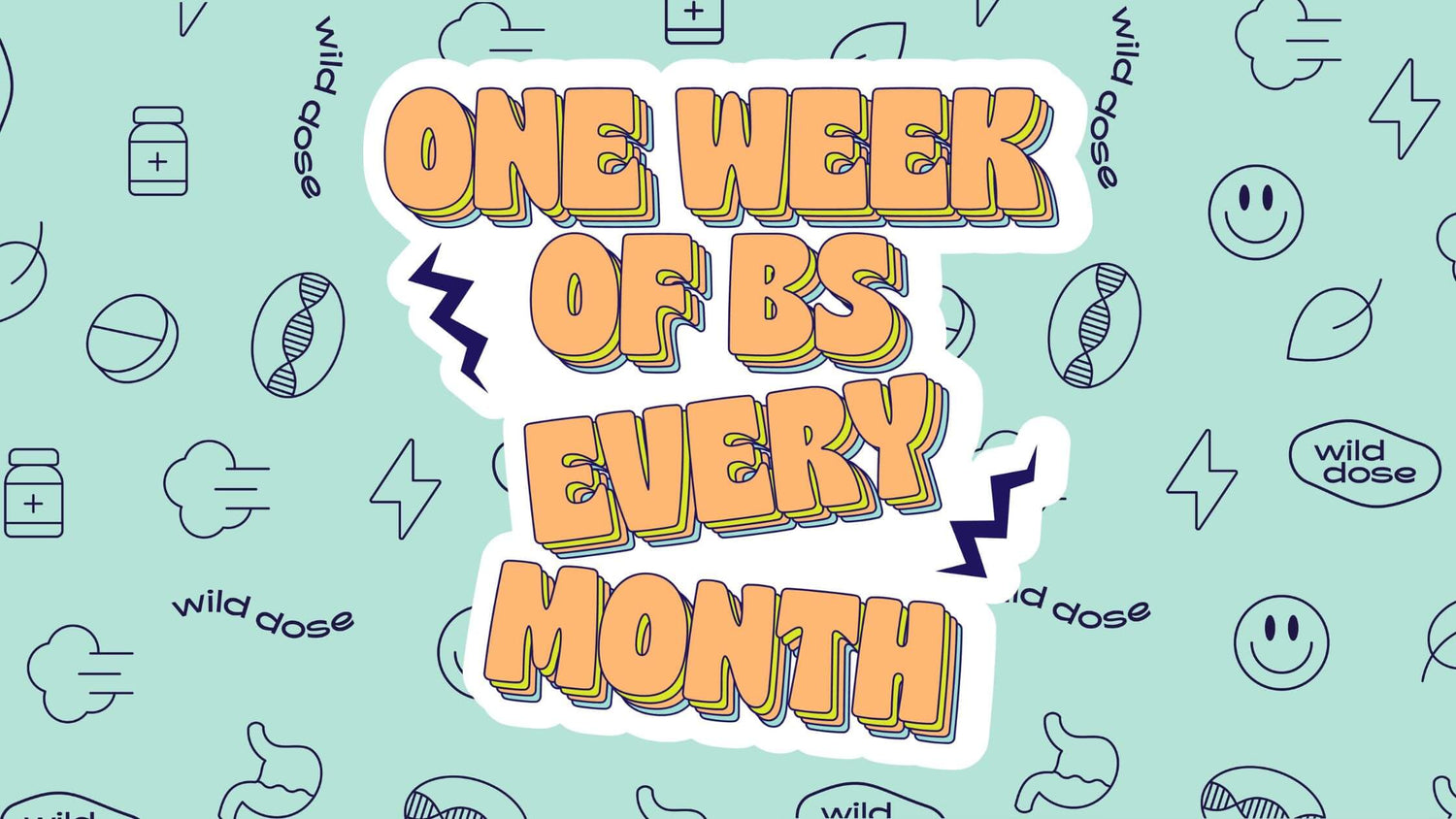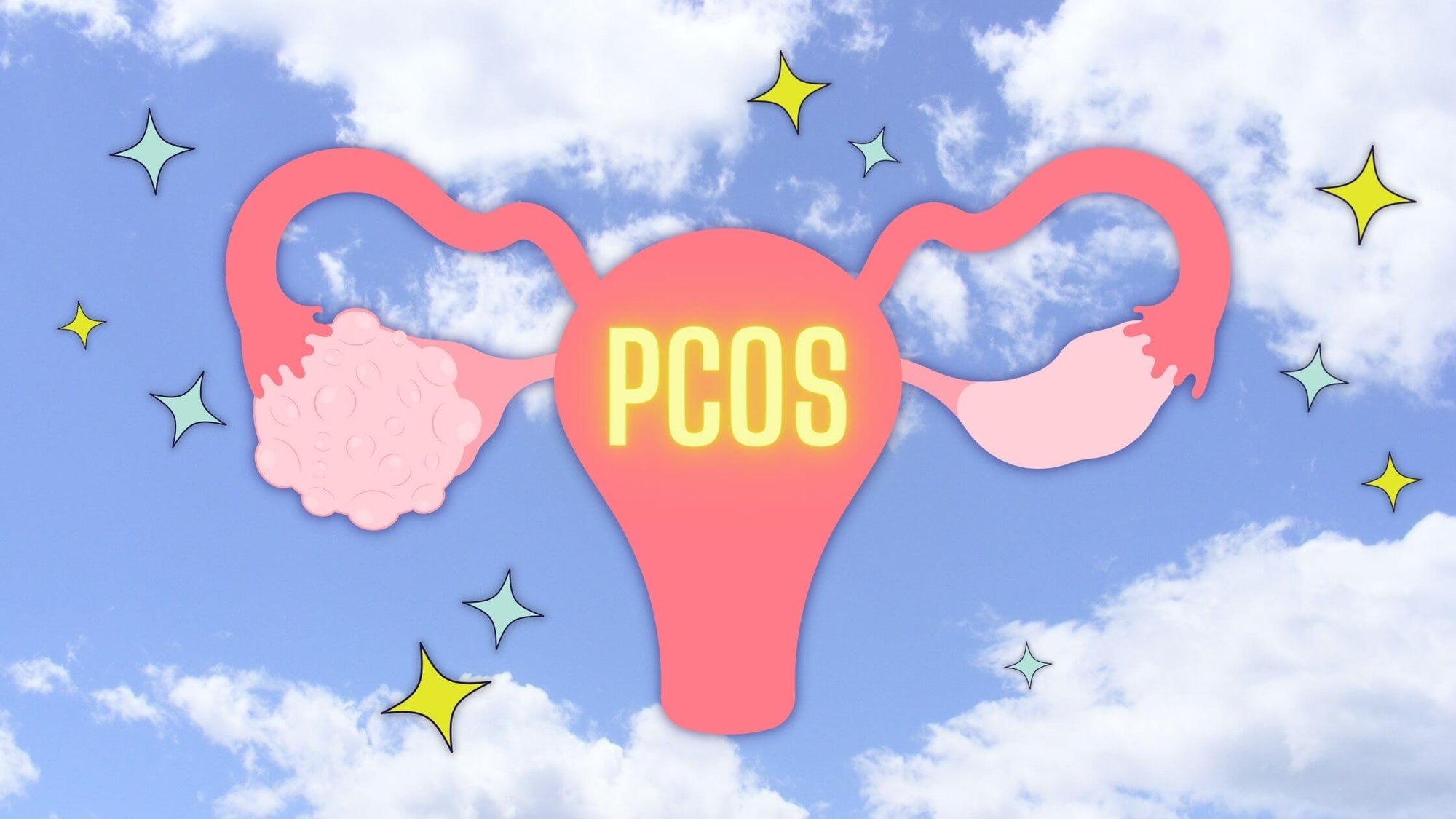How Does Period Bloating Happen?
Bloating is a common symptom of hormonal changes that occur during the reproductive cycle. More specifically, many women experience bloating and abdominal discomfort in the second half of their cycle.
The second half of the menstrual cycle is called the luteal phase, and this refers to the time period after ovulation all the way up to menstruation (your period). Usually, a healthy luteal phase is between 12 and 14 days, although some women can have short luteal phases if they’re stressed or have underlying hormonal imbalances.
The increased prevalence of bloating in the luteal phase is largely due to fluctuations in oestrogen and progesterone, two of the key reproductive hormones that regulate the menstrual cycle.
Let’s take a closer look at what period bloating is, how it is caused, what its main symptoms are, and what you can do to tackle this issue each month.
What Is Period Bloating?
Bloating refers to feeling fullness, tightness, and discomfort in the lower abdomen, usually accompanied by distension or swelling of the area. It’s a common symptom of a wide range of health conditions but is also a regular occurrence in menstruating women who can find themselves feeling uncomfortable and gassy at certain times in their monthly cycle.
Most of the time, period bloat appears in the few days leading up to menstruation, but some women experience it throughout their whole luteal phase. Let’s dive into the things that cause period bloating to rear its ugly head.
How Is Period Bloating Caused?
Oestrogen and progesterone cause changes in fluid and salt retention in the body. They can cause the body to hold onto more water in all areas of the body, including the digestive tract.
With extra water in the gastrointestinal tract, you’re more likely to experience bloating, gas, and abdominal discomfort. Depending on how rapidly your hormones fluctuate and whether you have any hormonal imbalances going on, you might get severe bloating.
You might experience bloating after ovulation and continue with it into your period. You can thank progesterone for this! However, the drop in oestrogen in the luteal phase is also to blame for increased water retention and digestive symptoms.
Progesterone can also slow down the contractions of the intestines, leading to constipation and bloating. The release of prostaglandins during menstruation can contribute to bloating by causing the muscles in the intestines to contract more strongly, causing cramps and even pain.
Dietary and lifestyle factors can also contribute to digestive issues. Consuming high-salt, high-sugar, or high-fat foods can increase inflammation and water retention, worsening bloating. Similarly, inadequate consumption of fibre or water can increase hormonal bloating.
Having caffeinated drinks can worsen muscle contractions and cramps around menstruation. Lack of physical activity can also contribute to digestive symptoms during the menstrual cycle. Although it’s generally recommended to avoid high-intensity movement during your period, gentle exercise can be beneficial to keep things moving through your digestive tract.
It's important to note that period bloating varies from person to person. Some individuals may experience it more severely than others, even if they follow the exact same diet and lifestyle.
What Are the Symptoms of Period Bloating?
Symptoms of period bloat can appear up to two weeks before you actually start bleeding. The exact symptoms can vary from person to person, as can the severity, but general bloating is normal around menstruation.
Generally, period bloating symptoms include:
- Abdominal distension - a feeling of fullness, tightness, and discomfort in the lower abdomen.
- Water retention - bloating is often associated with increased water retention in the digestive tract, as well as in the hands, feet, and face, leading to swelling and puffiness.
- Abdominal cramps - a lot of women experience cramping in their lower abdomen around menstruation, and it can range from mild to severe. Note that severe cramps are not normal or healthy, and you should speak to a specialist doctor if you’re experiencing debilitating cramps on your period!
- Temporary weight gain - excess water and gas in the body lead to a temporary increase in body weight. When your bloating subsides, your weight will return to normal.
- Excess gas - some women feel gassy around their period, leading to bloating and excessive flatulence.
- Constipation or diarrhoea - the hormonal changes that occur during the menstrual cycle can increase or decrease the muscle contractions of the gastrointestinal tract, leading to changes in bowel habits. You might be constipation or have diarrhoea, depending on the way your hormones impact your body.
- PMS symptoms - alongside period bloating, you might also experience mood changes, tender or painful breasts, fatigue, headaches, and hot flashes. Again, you can thank your sex hormones for this!
How Can I Avoid Period Bloating?
While it’s often impossible to completely stop bloating around your period, you can take steps to reduce it. If you usually only get mild period bloating, you might even be able to avoid it altogether by following the steps below. Of course, this will depend on how your body responds to the different things you’re doing and your hormone levels.
Here are some top tips for avoiding period bloating.
Avoid gassy foods and drinks
When you’re already prone to feeling gassy (such as when you’re on your period), it’s best to avoid foods that cause even more gas production. Your gut bugs ferment foods when they enter your colon, producing gas in the process.
Certain foods are fermented by your gut bacteria more than others, so avoiding these foods can be helpful to reduce excess gas during the latter end of your menstrual cycle. Gas-producing foods include:
- High-fructose fruits, such as bananas, pears, and apples
- Cruciferous vegetables
- Beans and legumes
- Yoghurt, sauerkraut, pickles, miso, tempeh, and tofu (basically, any fermented food)
- Protein powder supplements, especially whey-based powders
- Carbonated sodas and waters
- Fruit juice
- Energy drinks
Limit your sodium intake and increase your potassium intake
High-sodium foods, like ready meals, junk food, and pre-packaged snacks, increase water retention in the body, worsening period bloating. For this reason, it’s best to avoid foods that are high in sodium to prevent water retention and digestive issues.
Instead, choose high-potassium foods, which have the opposite effect and reduce water retention. Potassium helps with water excretion, as well as several other functions in the body, such as nerve impulse transmission, blood pressure, muscle contractions, and pH balance. Potassium-rich foods include bananas, avocados, potatoes, sweet potatoes, lentils, and dried fruit.
Stay hydrated by drinking enough water
Drinking adequate water is essential for reducing bloating. When your body is nice and hydrated, it’s better able to digest any food you eat and absorb nutrients efficiently. As a result, you’ll feel less sluggish and full, even when eating a large meal. Water also softens the stool, preventing constipation, bloating, gas, and abdominal cramps.
On average, you’ll need between two and three litres of water a day, but this depends on your activity levels and your unique physiology. If you’re somebody who doesn’t feel like exercising during your period, you might not need as much as somebody who continues to go to the gym, play sports, or walk long distances during this time of their cycle.
A good rule of thumb is to drink enough so that you never feel thirsty. As soon as you find yourself feeling thirsty, take a few sips of water. Remember that thirst is the first sign of dehydration, so tackling it as soon as you notice it will keep your body adequately hydrated and reduce digestive symptoms.
Avoid caffeinated drinks or alcohol
Caffeine and alcohol can exacerbate period bloating and abdominal cramps. Even if you’re a coffee, tea, and alcohol lover usually, they cause you to feel worse when you’re approaching or on your period.
Both caffeine and alcohol can increase smooth muscle contractions in the gut, causing abdominal cramps and pains. They’re also diuretics, meaning they increase water loss and dehydration risk.
Some women find that they’re perfectly fine drinking caffeine and alcohol at any stage of their menstrual cycle. If this is you, then you might not need to worry too much about your coffee and alcohol consumption during your period. Make sure you’re drinking enough water to counteract the diuretic effects of coffee, tea, and alcohol, though.
However, if you’re quite sensitive to caffeine and alcohol, switch to more digestion-friendly drinks, such as herbal teas (such as ginger, chamomile, and peppermint), decaffeinated coffee, and hot chocolate, when you’re menstruating. After all, there’s nothing more comforting than a steaming hot chocolate with marshmallows when you’re feeling sluggish and fatigued on your period!
Keep your body moving
Exercise can be one of the best bloating remedies around your period. Generally, low-intensity movement, such as gentle walking or yoga, is best when you’re not feeling 100% on your period. Doing high-intensity exercise can often worsen PMS symptoms, including bloating, and might make you feel even more fatigued and dizzy than you already do.
Any form of movement can help to push food through the digestive tract, preventing bloating, gas, and abdominal discomfort. Aim to move your body for around 30 minutes a day in a way that you enjoy and keep yourself hydrated throughout.
Take a probiotic supplement each day
Probiotics are live microorganisms, such as Lactobacillus and Bifidobacterium, that offer digestive benefits.
These beneficial bacteria occur naturally in fermented food and beverages such as yoghurt, sauerkraut, tempeh, kefir, and kombucha. They also reside naturally in your gut and form a large portion of the gut microbiome, where they perform essential functions for immunity, digestion, and vitamin production.
Numerous high-quality probiotic supplements are available in the market, including our A Dose For Bloating supplement, which contains two million live probiotic bacteria to promote gut health and aid digestion. Our supplement is available in an easy-to-swallow capsule format and is best taken daily to minimise or even eliminate period bloating.
Eat a well-balanced diet
Incorporating lots of healthy foods into your diet is ideal when you’re trying to reduce or avoid period bloating. Nutrient-dense foods fuel your body with everything it needs to keep your digestion working optimally.
Include complex carbohydrates, lean proteins, and healthy fats in every meal. Complex carbs include oats, rice, whole-grain bread, pasta, potatoes, and sweet potatoes. Lean protein is found in chicken, turkey, fish, tofu, tempeh, beans, and legumes. Healthy fats are abundant in oily fish, avocados, nuts, seeds, and nut butters.
Make sure to also include plenty of micronutrients in your diet during all phases of your menstrual cycle, particularly in the days leading up to your period and during menstruation itself. Vitamins and minerals are abundant in fruits, vegetables, whole grains, dairy products, and lean proteins. They support multiple functions in your body, including digestion.
Practice daily self-care
As ‘woo woo’ as self-care sounds, it’s an important concept. Self-care involves taking time to meet your needs and giving yourself space to relax and do the things you enjoy. It’s about being a little bit selfish!
When you’re on your period and you’re experiencing bloating, fatigue, and other hormone-related symptoms, there’s nothing better than self-care. Figure out what makes you feel good and incorporate these things into your daily routine (especially when you’re on your period).
Your self-care routine might include gentle exercise, meditation, gratitude, journaling, doing hobbies, relaxing in front of the TV, or socialising with loved ones. Self-care enables you to wind down and reduce your psychological stress. Since stress is a key driver of digestive issues, self-care can help to reduce period bloating.
Wear comfy clothes
The last thing you’ll want to do when you’re feeling bloated on your period is wear tight clothing. Choosing loose, baggy clothes will reduce feelings of discomfort wound your abdominal region, especially after eating meals.
Think elasticated waistbands, flowy skirts, and baggy jumpers! Choose clothes that will keep you warm in winter and cool in summer to increase your overall comfort and make menstruation a little easier to deal with.









